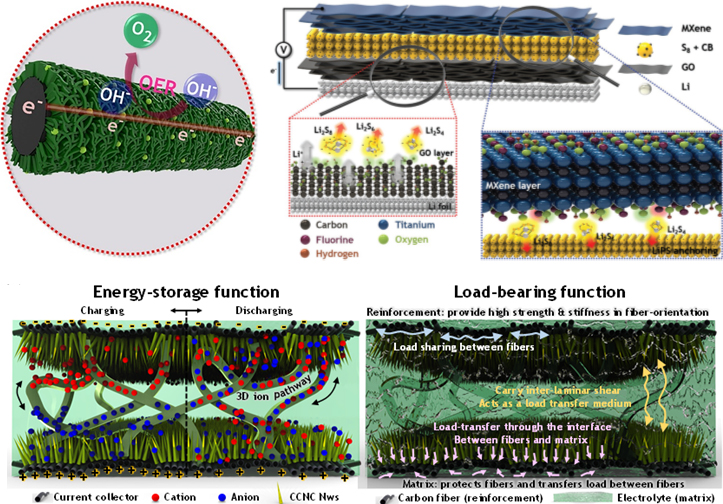- Energy Storage and Structural Battery
We develop structural battery possessing both load bearing capability and energy storage function.
Structural batteries are crucial to the next-generation transportation vehicles such as UAV, UAM, and electrical vehicles. -
Goal
We develop high-performance energy storage devices derived from diverse nanomaterials based on
-
1.
Transition metal carbides (MXenes) and Metal-Organic Frameworks
-
2.
Multi-dimensional transition metal oxides and sulfides
-
3.
Porous carbon materials (Covalent Triazine or Organic Frameworks)

-
-
Approach
-
1.
Porous active materials such as Covalent Organic Frameworks, Covalent Triazine Frameworks, and Metal-Organic Frameworks
-
2.
Growth of transition metal oxides/sulfides/carbides
-
3.
Carbon fabrics based structural electrodes with mechanical load bearing capability

-
-
Selected Publications
-
1.
M. Mahato†, S. Nam†, R. Tabassian, S. Oh, V. H. Nguyen, and I.-K. Oh*
Electronically Conjugated Multifunctional Covalent Triazine Framework for Unprecedented CO2 Selectivity and High-Power Flexible Supercapacitor
ADVANCED FUNCTIONAL MATERIALS, Vol. 32, Issue 5 (2022)
https://doi.org/10.1002/adfm.202107442 -
2.
P. Thangasamy, S. Oh, S. Nam, H. Randriamahazaka, and I.-K. Oh*
Ferrocene-Incorporated Cobalt Sulfide Nanoarchitecture for Superior Oxygen Evolution Reaction
Small, Vol. 16, Issue 31 (2020)
https://doi.org/10.1002/smll.202001665 -
3.
S. Oh, V. H. Nguyen, V.-T. Bui, S. Nam, M. Mahato, and I.-K. Oh*
Intertwined Nanosponge Solid-State Polymer Electrolyte for Rollable and Foldable Lithium-Ion Batteries
ACS Applied Materials & Interfaces, Vol. 12, Issue 10, Page 11657-11668 (2020)
https://doi.org/10.1021/acsami.9b22127 -
4.
S. Nam†, S. Umrao†, S. Oh, K. H. Shin, H. S. Park, and I.-K. Oh*
Sonochemical self-growth of functionalized titanium carbide nanorods on Ti3C2 nanosheets for high capacity anode for lithium-ion batteries
COMPOSITES PART B-ENGINEERING, Vol. 181 (2020)
https://doi.org/10.1016/j.compositesb.2019.107583 -
5.
J.-M. Son†, S. Oh†, S.-H. Bae, S. Nam, and I.-K. Oh*
A Pair of NiCo2O4 and V2O5 Nanowires Directly Grown on Carbon Fabric for Highly Bendable Lithium-Ion Batteries
Advanced Energy Materials, Vol. 9, Issue 18 (2019)
https://doi.org/10.1002/aenm.201900477 -
6.
S.-H. Bae, J.-E. Kim, H. Randriamahazaka, S.-Y. Moon, J.-Y. Park, and I.-K. Oh*
Seamlessly Conductive 3D Nanoarchitecture of Core–Shell Ni-Co Nanowire Network for Highly Efficient Oxygen Evolution
Advanced Energy Materials, Vol. 7, Issue 1 (2017) Selected as Front Cover Image
https://doi.org/10.1002/aenm.201601492
-
-
What is Energy Storage Structures?
Energy storage is the device that provides a source of electrical energy by direct conversion of chemical energy based on an electrochemical redox reaction, and it includes Lithium-Ion Batteries (LIBs), Sodium-Ion Batteries (SIBs), Lithium-Sulfur Batteries (LSBs), Lithium-Metal Batteries (LMBs), and Capacitors. Structural battery indicates the energy storage cells embedded into a composite structure efficiently so as to be used as both load-bearing and energy storage material. We are interested in electrode materials and solid-state electrolytes, which can be utilized in structural batteries. Regarding electrode materials, our focus is on versatile active materials based on Metal Oxide, Transition metal carbides (MXenes), Metal-Organic Frameworks (MOFs), and Covalent Organic and Triazine Frameworks (COFs, CTFs). For solid-state electrolytes for structural batteries, we are studying the mechanically flexible ones based on polymers, such as PEO, PVA, and Nafion, acting as backbone structures. As a complete application, we are trying to demonstrate structural batteries with both superior and stable electrochemical performance and mechanical load-bearing multifunctionality which are flexible, bendable, rollable, and foldable.
